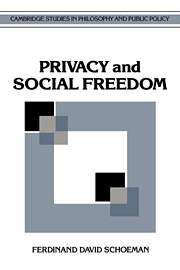Book contents
- Frontmatter
- Contents
- Acknowledgments
- Introduction
- 1 The meaning and scope of privacy
- 2 Mill's approach to social freedom
- 3 Articulated rationality and the Archimedean critique of culture
- 4 Social freedom from the perspective of cognitive and social psychology
- 5 The importance of cultural authority for morality
- 6 Explaining privacy's place
- 7 The ascent of privacy: a historical and conceptual account
- 8 Privacy and gossip
- 9 Privacy and spheres of life
- 10 Spheres of life: a literary exploration
- Epilogue
- Notes
- Index
3 - Articulated rationality and the Archimedean critique of culture
Published online by Cambridge University Press: 23 October 2009
- Frontmatter
- Contents
- Acknowledgments
- Introduction
- 1 The meaning and scope of privacy
- 2 Mill's approach to social freedom
- 3 Articulated rationality and the Archimedean critique of culture
- 4 Social freedom from the perspective of cognitive and social psychology
- 5 The importance of cultural authority for morality
- 6 Explaining privacy's place
- 7 The ascent of privacy: a historical and conceptual account
- 8 Privacy and gossip
- 9 Privacy and spheres of life
- 10 Spheres of life: a literary exploration
- Epilogue
- Notes
- Index
Summary
We saw in our discussion of Mill that reasoning in general and moral reasoning in particular were individuated and distrustful of culture. Culture lulled one into accepting as inevitable principles that should be challenged. Because only one's own reasoning is to be trusted, each person has the responsibility of constructing morality. Otherwise people just “parrot” received truths and betray their own nature. (Nothing comparable with Euclid's Elements is available to guide one on social and moral matters.)
This approach to moral reasoning generates a problem of how one is connected with other people. Any connection has to be constructed from within the theory rather than taken as a given. The process of constructing whatever connection is there strongly disposes, if not forces, the person to seek an answer in terms that in the first instance appeal to individualized values. Culture and connections with others, if valuable, are valuable because of what they offer the individual. Relations with others thereby theoretically are relegated to a dependent or secondary importance.
As it did in the case of Mill, this approach disposes one to regard social pressures as inappropriate and rationally corrupting. This disposition in turn promotes misunderstanding the role of privacy in the regulation of life and in its relationship to social freedom. Mill, recall, treated regard for a person's privacy as diminishing a person's opportunities for critical and helpful assessment by others in self-regarding domains of life.
- Type
- Chapter
- Information
- Privacy and Social Freedom , pp. 37 - 52Publisher: Cambridge University PressPrint publication year: 1992



